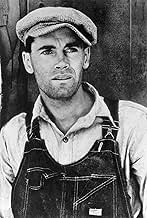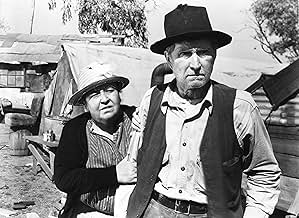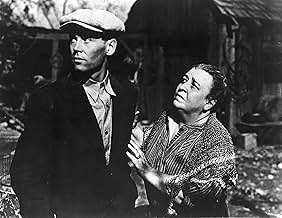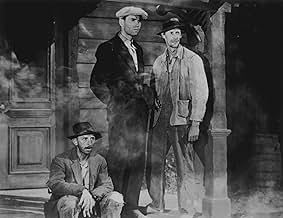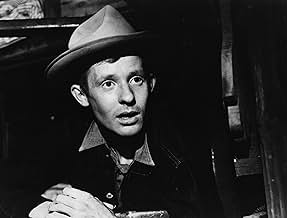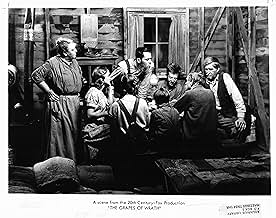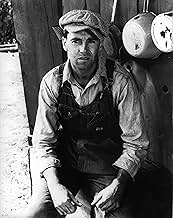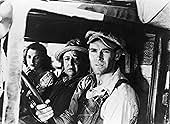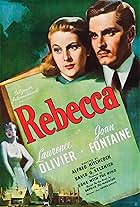An Oklahoma family, driven off their farm by the poverty and hopelessness of the Dust Bowl, joins the westward migration to California, suffering the misfortunes of the homeless in the Great... Read allAn Oklahoma family, driven off their farm by the poverty and hopelessness of the Dust Bowl, joins the westward migration to California, suffering the misfortunes of the homeless in the Great Depression.An Oklahoma family, driven off their farm by the poverty and hopelessness of the Dust Bowl, joins the westward migration to California, suffering the misfortunes of the homeless in the Great Depression.
- Won 2 Oscars
- 10 wins & 6 nominations total
- Director
- Writers
- All cast & crew
- Production, box office & more at IMDbPro
Storyline
Did you know
- TriviaPrior to filming, producer Darryl F. Zanuck sent undercover investigators out to the migrant camps to see if John Steinbeck had exaggerated about the squalor and unfair treatment meted out there. He was horrified to discover that Steinbeck had actually downplayed what went on in the camps.
- GoofsThe character, Noah (Frank Sully), after he's seen playing with his boat in the river, simply drops out of the story without any explanation, and does not appear again. In the book there is a brief reference to him going off on his own, but no explanation, whatever, is given in the film for his departure.
- Quotes
Tom Joad: I been thinking about us, too, about our people living like pigs and good rich land layin' fallow. Or maybe one guy with a million acres and a hundred thousand farmers starvin'. And I been wonderin' if all our folks got together and yelled...
Ma Joad: Oh, Tommy, they'd drag you out and cut you down just like they done to Casy.
Tom Joad: They'd drag me anyways. Sooner or later they'd get me for one thing if not for another. Until then...
Ma Joad: Tommy, you're not aimin' to kill nobody.
Tom Joad: No, Ma, not that. That ain't it. It's just, well as long as I'm an outlaw anyways... maybe I can do somethin'... maybe I can just find out somethin', just scrounge around and maybe find out what it is that's wrong and see if they ain't somethin' that can be done about it. I ain't thought it out all clear, Ma. I can't. I don't know enough.
Ma Joad: How am I gonna know about ya, Tommy? Why they could kill ya and I'd never know. They could hurt ya. How am I gonna know?
Tom Joad: Well, maybe it's like Casy says. A fellow ain't got a soul of his own, just little piece of a big soul, the one big soul that belongs to everybody, then...
Ma Joad: Then what, Tom?
Tom Joad: Then it don't matter. I'll be all around in the dark - I'll be everywhere. Wherever you can look - wherever there's a fight, so hungry people can eat, I'll be there. Wherever there's a cop beatin' up a guy, I'll be there. I'll be in the way guys yell when they're mad. I'll be in the way kids laugh when they're hungry and they know supper's ready, and when the people are eatin' the stuff they raise and livin' in the houses they build - I'll be there, too.
Ma Joad: I don't understand it, Tom.
Tom Joad: Me, neither, Ma, but - just somethin' I been thinkin' about.
- Alternate versionsInternational distributions (e.g. UK) have a short ~30 second prologue at the beginning to explain the historical context to the story to touch on the socio-economic problems in the US which arose during the Great Depression and the concurrent Dust Bowl.
- ConnectionsEdited into John Ford: The Man Who Invented America (2019)
- SoundtracksRed River Valley
(uncredited)
Traditional
Played during the opening credits and often in the score
Sung by Henry Fonda at the dance
Henry Fonda plays the part of Tom Joad, a young member of the family who is released from prison at the beginning of the film, only to find that his family has been driven from their home and is staying at his uncle's house until they can figure out what to do about their sudden homelessness. It is by pure coincidence that Tom was released early on good behavior, otherwise he may very well never have seen his family again. He finds them in a state of near desperation, as they begin more and more to realize the predicament that they are in. Their trek across half of the country, on their way to California to assume jobs that they've heard about, provides for a substantial portion of the plot and is extremely well-structured.
The family encounters every hardship imaginable on this journey, from family members dying to their struggle to feed themselves to their rickety old truck constantly breaking down. They run into disillusioned people who claim that they've been to California and there are really no jobs there, at least not nearly as many as there are people going to look for them. They are periodically and derogatorily referred to as `Okies,' a term which places them in a broad category of poor folks driven from there homes in middle America who are traveling to the coast to get jobs that aren't there. There is so much doubt and hardship presented that it is never really certain whether they really will find jobs. The audience is never able to assume a happy ending, because there is so much contrary foreshadowing throughout the film.
The struggles do not abate once the family reaches California and takes up shaky residence in residential areas that would be more accurately referred to as shanty towns, and the rest of the film is dominated by the family's efforts to survive in a new and unfamiliar place, while working for wages that are barely sufficient to prevent starvation. Ma Joad spends the majority of the film stressing the importance of keeping the family together, seeing it as the only thing that they really had left, but this is eventually set aside in favor of each member of the family not only surviving but also flourishing, which provides for one of the many powerful messages that the film delivers.
The Grapes of Wrath is not exactly an edge of your seat film, but it is a shockingly realistic portrayal of the suffering that so many people and families experienced during the Great Depression. The performances are flawless, and the experience is not only powerful and moving but also educational. It's no secret that most people do not watch movies to learn, but there comes a point, at least once in a great while, when a person should watch a film that requires a little mental thought processing, and in such cases, The Grapes of Wrath is an excellent choice.
- Anonymous_Maxine
- Feb 12, 2001
- Permalink
Details
- Release date
- Country of origin
- Language
- Also known as
- Highway 66
- Filming locations
- Topock, Arizona, USA(bridge crossing into California)
- Production company
- See more company credits at IMDbPro
Box office
- Budget
- $800,000 (estimated)
- Gross worldwide
- $7,304
- Runtime2 hours 9 minutes
- Color
- Aspect ratio
- 1.37 : 1
Contribute to this page



